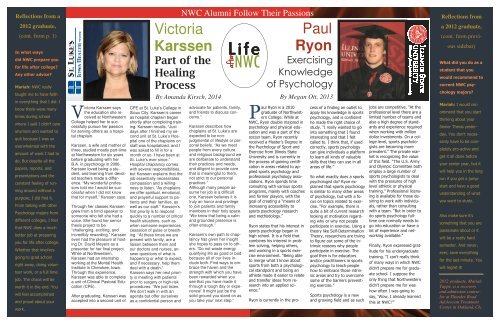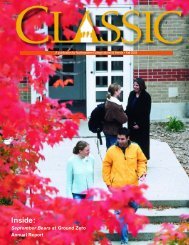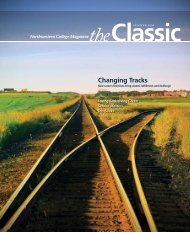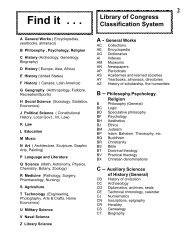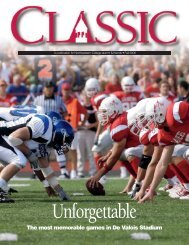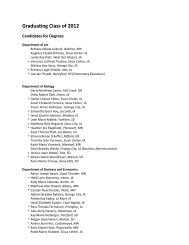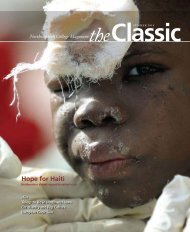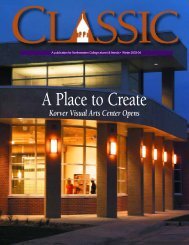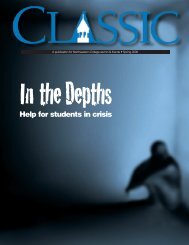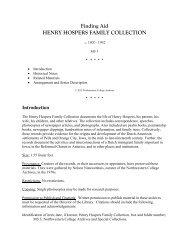2012 Psych Newsletter (Compressed) - Northwestern College
2012 Psych Newsletter (Compressed) - Northwestern College
2012 Psych Newsletter (Compressed) - Northwestern College
You also want an ePaper? Increase the reach of your titles
YUMPU automatically turns print PDFs into web optimized ePapers that Google loves.
Reflections from a<br />
<strong>2012</strong> graduate,<br />
(cont. from p. 1)<br />
In what ways<br />
did NWC prepare you<br />
for life after college?<br />
Any other advice?<br />
Mariah: NWC really<br />
taught me to have faith<br />
in everything that I did. I<br />
know there were many<br />
times during school<br />
where I said I didn't care<br />
anymore and wanted to<br />
quit because I was so<br />
overwhelmed with the<br />
amount of work I had to<br />
do. But despite all the<br />
papers, reports, and<br />
presentations and the<br />
constant feeling of running<br />
around without a<br />
purpose, I did find it.<br />
From talking with other<br />
<strong>Psych</strong>ology majors from<br />
different colleges, I feel<br />
that NWC does a much<br />
better job at preparing<br />
you for life after college.<br />
Whether that involves<br />
going to grad school<br />
right away, doing volunteer<br />
work, or a full time<br />
job. The chaos will be<br />
worth it in the end. You<br />
will feel accomplished<br />
and proud about your<br />
work.<br />
V<br />
ictoria Karssen says<br />
the education she received<br />
at <strong>Northwestern</strong><br />
<strong>College</strong> helped her to successfully<br />
pursue her passion<br />
for serving others as a hospital<br />
chaplain.<br />
Karssen, a wife and mother of<br />
three, studied mostly part-time<br />
at <strong>Northwestern</strong> for six years<br />
before graduating with her<br />
B.A. in psychology in 2006.<br />
Karssen loved being a student,<br />
and learning from devoted<br />
teachers made a difference.<br />
“My wonderful professors<br />
told me I would be successful<br />
when I did not know<br />
that for myself,” Karssen says.<br />
Through her classes Karssen<br />
grew from a timid speaker to<br />
someone who felt she had a<br />
voice. She found her senior<br />
thesis project to be<br />
“challenging, exciting, and<br />
incredibly rewarding.” Karssen<br />
even had the pleasure of hosting<br />
Dr. David Meyers as a<br />
presenter for her final project.<br />
While at <strong>Northwestern</strong>,<br />
Karssen had an internship<br />
working at the Mental Health<br />
Institute in Cherokee, Iowa.<br />
Through this experience,<br />
Karssen was able to complete<br />
a unit of Clinical Pastoral Education<br />
(CPE).<br />
After graduating, Karssen was<br />
accepted into a second unit of<br />
Victoria<br />
Karssen<br />
Part of the<br />
Healing<br />
Process<br />
By Amanda Kirsch, 2014<br />
CPE at St. Luke’s <strong>College</strong> in<br />
Sioux City. Karssen’s career<br />
as hospital chaplain began<br />
shortly after completing training.<br />
Karssen recalls, “Just<br />
days after I finished my second<br />
unit at St. Luke’s Hospital<br />
one of the chaplains on<br />
staff was hospitalized, and I<br />
was asked to fill in for a<br />
month or so. I have been at<br />
St. Luke’s ever since.”<br />
Hospital chaplaincy comes<br />
with several responsibilities,<br />
but Karssen explains that the<br />
job essentially necessitates<br />
compassion and a willingness<br />
to listen. “As chaplains<br />
we offer spiritual, emotional,<br />
and prayerful support to patients<br />
and their families, as<br />
well as our staff.” Karssen’s<br />
first priority is to respond<br />
quickly to a number of critical<br />
health situations, such as<br />
when someone experiences<br />
cessation of pulse or breathing.<br />
“At these times we are<br />
present with family, are a<br />
liaison between them and<br />
our doctors and nurses, answer<br />
questions of what is<br />
happening or what to expect,<br />
and if necessary, help them<br />
deal with a death.”<br />
Karssen says her next priority<br />
is meeting with patients<br />
prior to surgery or high-risk<br />
procedures. “We just listen.<br />
We don’t walk in with an<br />
agenda but offer ourselves<br />
as a confidential person and<br />
NWC Alumni Follow Their Passions<br />
advocate for patients, family,<br />
and friends to discuss concerns.”<br />
Karssen describes how<br />
chaplains at St. Luke’s are<br />
expected to be nonjudgmental<br />
of lifestyle or personal<br />
beliefs. “As we meet<br />
people from every culture<br />
and religious background we<br />
are deliberate to understand<br />
their practices and needs,<br />
and diligent to provide care<br />
that is meaningful to them,<br />
not strict to our personal<br />
practices.”<br />
Although many people assume<br />
her job is a difficult<br />
one, Karssen believes it is<br />
truly an honor and privilege<br />
to join patients and family<br />
members in their holy space.<br />
“We know that being a calm<br />
and grounded presence is<br />
often enough.”<br />
Karssen’s own path to chaplaincy<br />
has given her insight<br />
she hopes to pass on to others.<br />
“Do not waste energy<br />
qualifying life as good or bad<br />
because all of our lives include<br />
both. Find ways to embrace<br />
the haven and the<br />
strength with which you have<br />
been rewarded when you<br />
see that you have made it<br />
through a tough day or experience!<br />
It might just be the<br />
solid ground you stand on as<br />
you take your next step.”<br />
Life<br />
afterLife<br />
NWC<br />
after<br />
Exercising<br />
Knowledge<br />
of <strong>Psych</strong>ology<br />
P<br />
aul Ryon is a 2010<br />
graduate of <strong>Northwestern</strong><br />
<strong>College</strong>. While at<br />
NWC, Ryon double majored in<br />
psychology and physical education<br />
and was a part of the<br />
soccer team. Ryon recently<br />
received a Master’s Degree in<br />
the <strong>Psych</strong>ology of Sport and<br />
Exercise from Illinois State<br />
University and is currently in<br />
the process of gaining certification<br />
in areas related to applied<br />
sports psychology and<br />
professional psychology associations.<br />
Ryon spends time<br />
consulting with various sports<br />
programs, mainly with coaches<br />
and former players, with the<br />
goal of creating a “means of<br />
increasing accessibility to<br />
sports psychology research<br />
and methodology.”<br />
Ryon states that his interest in<br />
sports psychology began in<br />
high school. It is a field that<br />
combines his interest in problem<br />
solving, helping others,<br />
and working in a sports exercise<br />
environment. “Being able<br />
to merge what I know about<br />
sports from both a psychological<br />
standpoint and being an<br />
athlete made it easier to relate<br />
and transfer ideas from research<br />
into an applied science.”<br />
Paul<br />
Ryon<br />
By Megan Ott, 2013<br />
Ryon is currently in the process<br />
of a finding an outlet to<br />
apply his knowledge in sports<br />
psychology, and is confident<br />
he made the right choice of<br />
study. “I really wanted to go<br />
into something that I found<br />
interesting and that I felt<br />
called to. I think that, if used<br />
correctly, sports psychology<br />
can give individuals a platform<br />
to learn all kinds of valuable<br />
skills that they can use in all<br />
areas of life.”<br />
So what exactly does a sports<br />
psychologist do? Ryon explained<br />
that sports psychology<br />
is similar to many other areas<br />
of psychology, but with a focus<br />
on topics related to exercise.<br />
“For example, there is<br />
quite a bit of current research<br />
looking at motivation regarding<br />
why or why not people<br />
participate in exercise. Using a<br />
theory like Self-Determination<br />
Theory, researchers are trying<br />
to figure out some of the intrinsic<br />
reasons why people<br />
participate in exercise. The<br />
goal then is for educators<br />
and/or practitioners in sports<br />
psychology to teach people<br />
how to embrace those intrinsic<br />
areas and try to overcome<br />
some of the barriers preventing<br />
exercise.”<br />
Sports psychology is a new<br />
and growing field and as such<br />
jobs are competitive. “At the<br />
professional level there are a<br />
limited number of teams and<br />
also a high degree of standards<br />
and experience required<br />
when working with million<br />
dollar investments. On a college<br />
level, sports psychologists<br />
are becoming more<br />
prevalent.” The private market<br />
is recognizing the value<br />
of this field. “The U.S. Army<br />
and Olympic Committee both<br />
employ a large number of<br />
sports psychologists to deal<br />
with the pressures of high<br />
level athletic or physical<br />
training.” Professional licensing<br />
is available for those desiring<br />
to work with individuals,<br />
rather than consulting<br />
with a team. “But in order to<br />
do sports psychology fulltime<br />
one normally needs to<br />
go into education or have a<br />
bit of experience and networking<br />
available.”<br />
Finally, Ryon expressed gratitude<br />
for his undergraduate<br />
training. “I can’t really think<br />
of many ways in which NWC<br />
didn’t prepare me for graduate<br />
school. I suppose the<br />
only thing that <strong>Northwestern</strong><br />
didn’t prepare me for was<br />
how often I was going to<br />
say, ‘Wow, I already learned<br />
this at NWC!’”<br />
Reflections from<br />
a <strong>2012</strong> graduate,<br />
(cont. from previous<br />
sidebar)<br />
What did you do as a<br />
student that you<br />
would recommend to<br />
current NWC psychology<br />
majors?<br />
Mariah: I would recommend<br />
that you start<br />
thinking about your<br />
Senior Thesis yesterday.<br />
You don't necessarily<br />
have to be completely<br />
pro-active and<br />
get it all done before<br />
your senior year, but it<br />
will help you in the long<br />
run if you get a jumpstart<br />
and have a good<br />
understanding of what<br />
you want to study.<br />
Also make sure it's<br />
something that you are<br />
passionate about or it<br />
will be a really hard<br />
semester. And never,<br />
ever, save everything<br />
for the last minute. You<br />
will regret it!<br />
<strong>2012</strong> graduate, Mariah<br />
Tappe, is a recovery<br />
and admission counselor<br />
at Thunder Road<br />
Adolescent Treatment<br />
Center in Oakland, CA.


